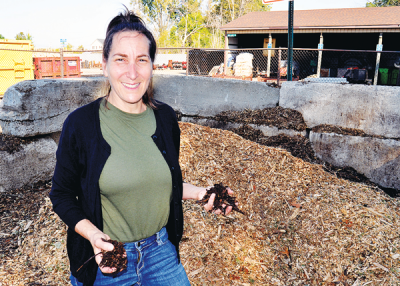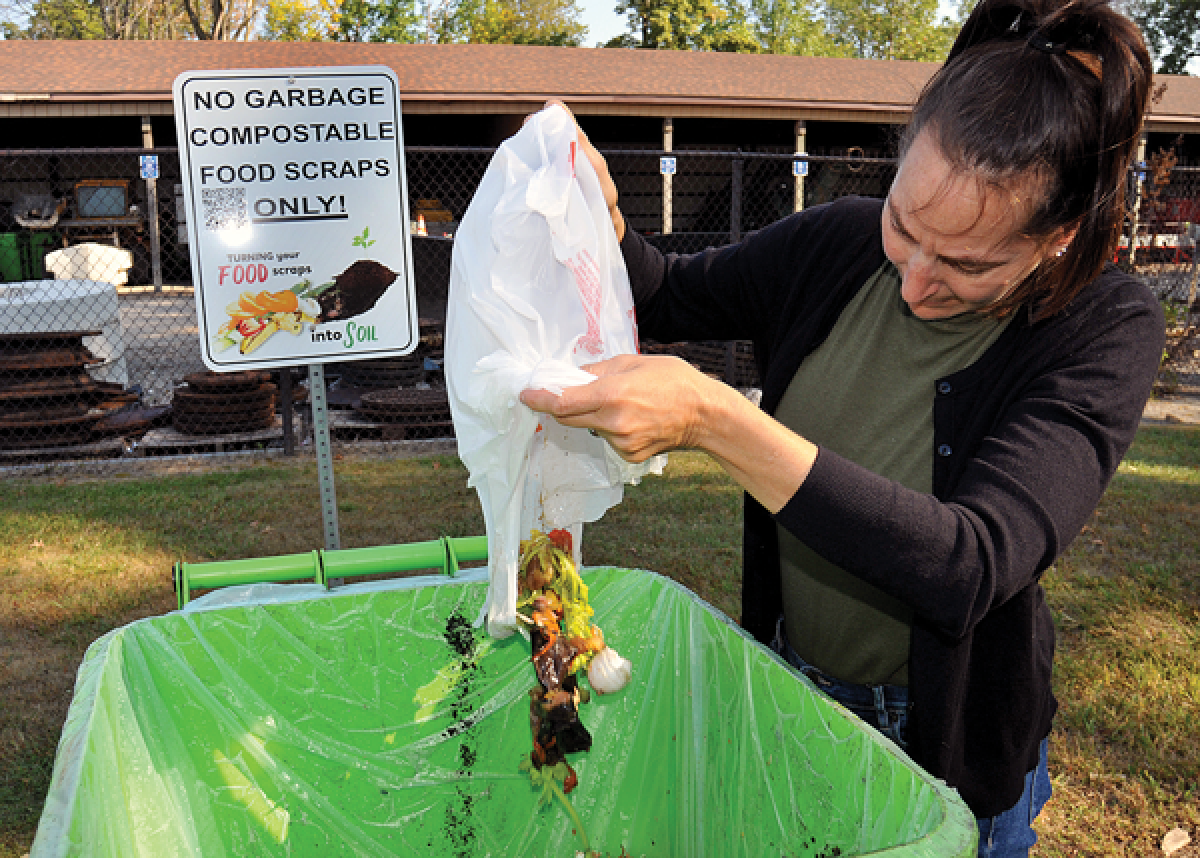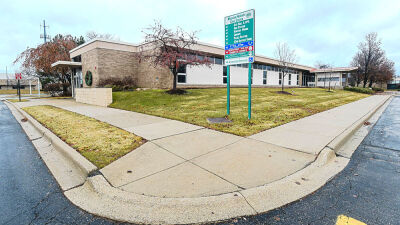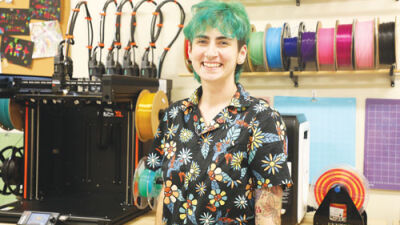
In addition to collecting scraps to be converted into eco-friendly compost, the Department of Public Services has wood chips available for free for Madison Heights residents.
Photo by Liz Carnegie
MADISON HEIGHTS — Earlier this month, the city of Madison Heights launched a program where residents can drop off food waste at the Department of Public Services so that it can be converted into compost — a nutrient-rich material used as fertilizer for plants.
The program launched Sept. 1 in partnership with MyGreen Michigan. The DPS is located at 801 Ajax Drive, and the designated drop-off site is accessible 24 hours a day.
Among the items that residents can drop off there are fruits, vegetables, coffee grounds and filters, cooking grease, bread, eggshells, flowers, dairy products, meat, bones, chemical-free napkins and paper towels, and BPI-certified products such as restaurant takeout containers.
The idea is to keep such waste out of landfills, where it decays into greenhouse gasses. Instead, the waste will be turned into compost that can be used to improve the soil quality of gardens and green spaces.
“I think it’s crucial for us to encourage residents through our policies to support environmental sustainability programs that reduce our carbon footprint,” said Madison Heights City Councilman Quinn Wright. “It’s also important to provide programs our residents want. Compost is one of them, and it’s another benefit of moving to Madison Heights, getting those quality-of-life elements that maybe they couldn’t get in other cities.”
Madison Heights Mayor Roslyn Grafstein and Madison Heights City Councilwoman Emily Rohrbach were strong supporters of the program. Rohrbach has also been the council representative on the city’s Environmental Citizens Committee since 2019.
“The composting program is one of many efforts we are taking as a city and community members to address climate change,” Rohrbach said via email. “There is no single thing a city or individual can do to move the needle, but as a group taking many small steps, I believe we can make a real impact.”
Rohrbach said the ECC has taken many actions to this end, including the planting of more than 600 new trees, the addition of native gardens at local parks, the installation of rain gardens in low-lying areas, and providing grant funding for residents to start their own native gardens, funded by native plant sales organized and staffed by ECC volunteers.
“The composting program is just the latest effort,” Rohrbach said, thanking city staff for their work crafting the pilot program. “I’m excited to see our residents begin to utilize this program and reduce our community’s carbon footprint by reducing and composting food waste.
“I know my own mother, who is a resident of Madison Heights, has been clamoring for a composting program for years. She was storing food scraps in her chest freezer for a long time,” Rohrbach said. “So when this program launched Sept. 1, she was ecstatic to pack up those food scraps and drop them off at our DPS. The fact that it’s a resource with 24-hour access makes it easier for residents to take advantage at their convenience.”
Melissa Marsh, the city manager of Madison Heights, said that city staff looked at vendors used by neighboring cities like Ferndale and also Northville, which led them to connect with the people at MyGreen Michigan, an organic collection company that provides composting for Michigan gardens, farms and landscapes. They pick up biweekly with the option for more frequent pickups. Marsh said Madison Heights may increase pickups once the program becomes more popular.
“The program is currently a pilot program for one year. However, we’re encouraged by the amount of compost we received the first two weeks,” Marsh said. “The service will be available year-round and can accept food scraps that can’t be handled in a home compost system, such as meat and bones. They say, ‘If it grows, it goes!’”
Grafstein said she started talking about the concept seven years ago when she first ran for the City Council, and that it was an early goal of hers upon reviving the ECC in 2018. She said that in addition to reducing harmful greenhouse gasses such as methane and enriching the soil with nutrients, compost has the added benefit of saving gardeners money since it reduces the need for expensive commercial fertilizers.
“I have been using backyard composers since I moved here 20 years ago. They are covered rotating composters off the ground, so we do not have rodent issues like those that can be associated with other types of composters. However, we do not put in meat products and eggshells, since they take a long time to decompose. So, we will be taking those to the Ajax site,” Grafstein said via email. “For residents concerned with potential odor issues or attracting rodents in their yard, the drop-off compost provides them an opportunity to still participate.
“I am extremely proud of the environmental progress that has been made since I revived the ECC,” she said. “In 2017, the year I was elected to council, the city planted only 12 trees. Now, we have planted over 500 trees in the last five years. And not only are we finally repopulating our tree canopy, we have also earned the distinction of being named a Tree City since 2020. Our commitment to sustainability has been further recognized through our bronze- and silver-level membership as a Michigan Green Community since 2021.”
Grafstein also highlighted how the city has updated its master plan and zoning ordinances in recent years with a focus on spurring growth while promoting nonmotorized transportation.
“This pilot program for food scrap composting is another key step towards reducing our carbon footprint, and building a more sustainable future,” Grafstein said.
 Publication select ▼
Publication select ▼




















